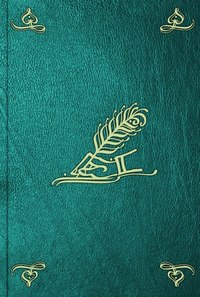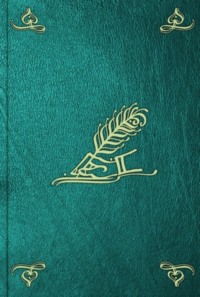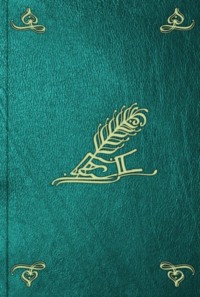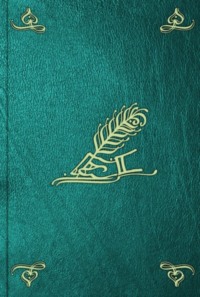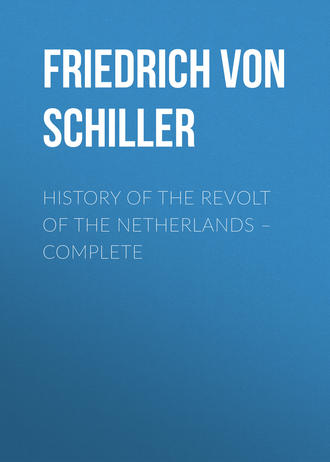 полная версия
полная версияHistory of the Revolt of the Netherlands – Complete
Moreover, Spain maintained this expensive war with dead, unfructifying gold, that never returned into the hand which gave it away, while it raised to her the price of every necessary. The treasuries of the republic were industry and commerce. Time lessened the one whilst it multiplied the other, and exactly in the same proportion that the resources of the Spanish government became exhausted by the long continuance of the war the republic began to reap a richer harvest. Its field was sown sparingly with the choice seed which bore fruit, though late, yet a hundredfold; but the tree from which Philip gathered fruit was a fallen trunk which never again became verdant.
Philip’s adverse destiny decreed that all the treasures which he lavished for the oppression of the Provinces should contribute to enrich them. The continual outlay of Spanish gold had diffused riches and luxury throughout Europe; but the increasing wants of Europe were supplied chiefly by the Netherlanders, who were masters of the commerce of the known world, and who by their dealings fixed the price of all merchandise. Even during the war Philip could not prohibit his own subjects from trading with the republic; nay, he could not even desire it. He himself furnished the rebels with the means of defraying the expenses of their own defence; for the very war which was to ruin them increased the sale of their goods. The enormous suns expended on his fleets and armies flowed for the most part into the exchequer of the republic, which was more or less connected with the commercial places of Flanders and Brabant. Whatever Philip attempted against the rebels operated indirectly to their advantage.
The sluggish progress of this war did the king as much injury as it benefited the rebels. His army was composed for the most part of the remains of those victorious troops which had gathered their laurels under Charles V. Old and long services entitled them to repose; many of them, whom the war had enriched, impatiently longed for their homes, where they might end in ease a life of hardship. Their former zeal, their heroic spirit, and their discipline relaxed in the same proportion as they thought they had fully satisfied their honor and their duty, and as they began to reap at last the reward of so many battles. Besides, the troops which had been accustomed by their irresistible impetuosity to vanquish all opponents were necessarily wearied out by a war which was carried on not so much against men as against the elements; which exercised their patience more than it gratified their love of glory; and where there was less of danger than of difficulty and want to contend with. Neither personal courage nor long military experience was of avail in a country whose peculiar features gave the most dastardly the advantage. Lastly, a single discomfiture on foreign ground did them more injury than any victories gained over an enemy at home could profit them. With the rebels the case was exactly the reverse. In so protracted a war, in which no decisive battle took place, the weaker party must naturally learn at last the art of defence from the stronger; slight defeats accustomed him to danger; slight victories animated his confidence.
At the beginning of the war the republican army scarcely dared to show itself in the field; the long continuance of the struggle practised and hardened it. As the royal armies grew wearied of victory, the confidence of the rebels rose with their improved discipline and experience. At last, at the end of half a century, master and pupil separated, unsubdued, and equal in the fight.
Again, throughout the war the rebels acted with more concord and unanimity than the royalists. Before the former had lost their first leader the government of the Netherlands had passed through as many as five hands. The Duchess of Parma’s indecision soon imparted itself to the cabinet of Madrid, which in a short time tried in succession almost every system of policy. Duke Alva’s inflexible sternness, the mildness of his successor Requescens, Don John of Austria’s insidious cunning, and the active and imperious mind of the Prince of Parma gave as many opposite directions to the war, while the plan of rebellion remained the same in a single head, who, as he saw it clearly, pursued it with vigor. The king’s greatest misfortune was that right principles of action generally missed the right moment of application. In the commencement of the troubles, when the advantage was as yet clearly on the king’s side, when prompt resolution and manly firmness might have crushed the rebellion in the cradle, the reigns of government were allowed to hang loose in the hands of a woman. After the outbreak had come to an open revolt, and when the strength of the factious and the power of the king stood more equally balanced, and when a skilful flexible prudence could alone have averted the impending civil war, the government devolved on a man who was eminently deficient in this necessary qualification. So watchful an observer as William the Silent failed not to improve every advantage which the faulty policy of his adversary presented, and with quiet silent industry he slowly but surely pushed on the great enterprise to its accomplishment.
But why did not Philip II. himself appear in the Netherlands? Why did he prefer to employ every other means, however improbable, rather than make trial of the only remedy which could insure success? To curb the overgrown power and insolence of the nobility there was no expedient more natural than the presence of their master. Before royalty itself all secondary dignities must necessarily have sunk in the shade, all other splendor be dimmed. Instead of the truth being left to flow slowly and obscurely through impure channels to the distant throne, so that procrastinated measures of redress gave time to ripen ebullitions of the moment into acts of deliberation, his own penetrating glance would at once have been able to separate truth from error; and cold policy alone, not to speak of his humanity, would have saved the land a million citizens. The nearer to their source the more weighty would his edicts have been; the thicker they fell on their objects the weaker and the more dispirited would have become the efforts of the rebels. It costs infinitely more to do an evil to an enemy in his presence than in his absence. At first the rebellion appeared to tremble at its own name, and long sheltered itself under the ingenious pretext of defending the cause of its sovereign against the arbitrary assumptions of his own viceroy. Philip’s appearance in Brussels would have put an end at once to this juggling. In that case, the rebels would have been compelled to act up to their pretence, or to cast aside the mask, and so, by appearing in their true shape, condemn themselves. And what a relief for the Netherlands if the king’s presence had only spared them those evils which were inflicted upon them without his knowledge, and contrary to his will. 1 What gain, too, even if it had only enabled him to watch over the expenditure of the vast sums which, illegally raised on the plea of meeting the exigencies of the war, disappeared in the plundering hands of his deputies.
What the latter were compelled to extort by the unnatural expedient of terror, the nation would have been disposed to grant to the sovereign majesty. That which made his ministers detested would have rendered the monarch feared; for the abuse of hereditary power is less painfully oppressive than the abuse of delegated authority. His presence would have saved his exchequer thousands had he been nothing more than an economical despot; and even had he been less, the awe of his person would have preserved a territory which was lost through hatred and contempt for his instruments.
In the same manner, as the oppression of the people of the Netherlands excited the sympathy of all who valued their own rights, it might have been expected that their disobedience and defection would have been a call to all princes to maintain their own prerogatives in the case of their neighbors. But jealousy of Spain got the better of political sympathies, and the first powers of Europe arranged themselves more or less openly on the side of freedom.
Although bound to the house of Spain by the ties of relationship, the Emperor Maximilian II. gave it just cause for its charge against him of secretly favoring the rebels. By the offer of his mediation he implicitly acknowledged the partial justice of their complaints, and thereby encouraged them to a resolute perseverance in their demands. Under an emperor sincerely devoted to the interests of the Spanish house, William of Orange could scarcely have drawn so many troops and so much money from Germany. France, without openly and formally breaking the peace, placed a prince of the blood at the head of the Netherlandish rebels; and it was with French gold and French troops that the operations of the latter were chiefly conducted. 2 Elizabeth of England, too, did but exercise a just retaliation and revenge in protecting the rebels against their legitimate sovereign; and although her meagre and sparing aid availed no farther than to ward off utter ruin from the republic, still even this was infinitely valuable at a moment when nothing but hope could have supported their exhausted courage. With both these powers Philip at the time was at peace, but both betrayed him. Between the weak and the strong honesty often ceases to appear a virtue; the delicate ties which bind equals are seldom observed towards him whom all men fear. Philip had banished truth from political intercourse; he himself had dissolved all morality between kings, and had made artifice the divinity of cabinets. Without once enjoying the advantages of his preponderating greatness, he had, throughout life, to contend with the jealousy which it awakened in others. Europe made him atone for the possible abuses of a power of which in fact he never had the full possession.
If against the disparity between the two combatants, which, at first sight, is so astounding, we weigh all the incidental circumstances which were adverse to Spain, but favorable to the Netherlands, that which is supernatural in this event will disappear, while that which is extraordinary will still remain – and a just standard will be furnished by which to estimate the real merit of these republicans in working out their freedom. It must not, however, be thought that so accurate a calculation of the opposing forces could have preceded the undertaking itself, or that, on entering this unknown sea, they already knew the shore on which they would ultimately be landed. The work did not present itself to the mind of its originator in the exact form which it assumed when completed, any more than the mind of Luther foresaw the eternal separation of creeds when he began to oppose the sale of indulgences. What a difference between the modest procession of those suitors in Brussels, who prayed for a more humane treatment as a favor, and the dreaded majesty of a free state, which treated with kings as equals, and in less than a century disposed of the throne of its former tyrant. The unseen hand of fate gave to the discharged arrow a higher flight, and quite a different direction from that which it first received from the bowstring. In the womb of happy Brabant that liberty had its birth which, torn from its mother in its earliest infancy, was to gladden the so despised Holland. But the enterprise must not be less thought of because its issue differed from the first design. Man works up, smooths, and fashions the rough stone which the times bring to him; the moment and the instant may belong to him, but accident develops the history of the world. If the passions which co-operated actively in bringing about this event were only not unworthy of the great work to which they were unconsciously subservient – if only the powers which aided in its accomplishment were intrinsically noble, if only the single actions out of whose great concatenation it wonderfully arose were beautiful then is the event grand, interesting, and fruitful for us, and we are at liberty to wonder at the bold offspring of chance, or rather offer up our admiration to a higher intelligence.
The history of the world, like the laws of nature, is consistent with itself, and simple as the soul of man. Like conditions produce like phenomena. On the same soil where now the Netherlanders were to resist their Spanish tyrants, their forefathers, the Batavi and Belgee, fifteen centuries before, combated against their Roman oppressors. Like the former, submitting reluctantly to a haughty master, and misgoverned by rapacious satraps, they broke off their chain with like resolution, and tried their fortune in a similar unequal combat. The same pride of conquest, the same national grandeur, marked the Spaniard of the sixteenth century and the Roman of the first; the same valor and discipline distinguished the armies of both, their battle array inspired the same terror. There as here we see stratagem in combat with superior force, and firmness, strengthened by unanimity, wearying out a mighty power weakened by division; then as now private hatred armed a whole nation; a single man, born for his times, revealed to his fellow-slaves the dangerous Secret of their power, and brought their mute grief to a bloody announcement. “Confess, Batavians,” cries Claudius Civilis to his countrymen in the sacred grove, “we are no longer treated, as formerly, by these Romans as allies, but rather as slaves. We are handed over to their prefects and centurions, who, when satiated with our plunder and with our blood, make way for others, who, under different names, renew the same outrages. If even at last Rome deigns to send us a legate, he oppresses us with an ostentatious and costly retinue, and with still more intolerable pride. The levies are again at hand which tear forever children from their parents, brothers from brothers. Now, Batavians, is our time. Never did Rome lie so prostrate as now. Let not their names of legions terrify you. There is nothing in their camps but old men and plunder. Our infantry and horsemen are strong; Germany is allied to us by blood, and Gaul is ready to throw off its yoke. Let Syria serve them, and Asia and the East, who are used to bow before kings; many still live who were born among us before tribute was paid to the Romans. The gods are ever with the brave.” Solemn religious rites hallowed this conspiracy, like the League of the Gueux; like that, it craftily wrapped itself in the veil of submissiveness, in the majesty of a great name. The cohorts of Civilis swear allegiance on the Rhine to Vespasian in Syria, as the League did to Philip II. The same arena furnished the same plan of defence, the same refuge to despair. Both confided their wavering fortunes to a friendly element; in the same distress Civilis preserves his island, as fifteen centuries after him William of Orange did the town of Leyden – through an artificial inundation. The valor of the Batavi disclosed the impotency of the world’s ruler, as the noble courage of their descendants revealed to the whole of Europe the decay of Spanish greatness. The same fecundity of genius in the generals of both times gave to the war a similarly obstinate continuance, and nearly as doubtful an issue; one difference, nevertheless, distinguishes them: the Romans and Batavians fought humanely, for they did not fight for religion.
BOOK I.
EARLIER HISTORY OF THE NETHERLANDS UP TO THE SIXTEENTH CENTURY
Before we consider the immediate history of this great revolution, it will be advisable to go a few steps back into the ancient records of the country, and to trace the origin of that constitution which we find it possessed of at the time of this remarkable change.
The first appearance of this people in the history of the world is the moment of its fall; their conquerors first gave them a political existence. The extensive region which is bounded by Germany on the east, on the south by France, on the north and northwest by the North Sea, and which we comprehend under the general name of the Netherlands, was, at the time when the Romans invaded Gaul, divided amongst three principal nations, all originally of German descent, German institutions, and German spirit. The Rhine formed its boundaries. On the left of the river dwelt the Belgae, on its right the Frisii, and the Batavi on the island which its two arms then formed with the ocean. All these several nations were sooner or later reduced into subjection by the Romans, but the conquerors themselves give us the most glorious testimony to their valor. The Belgae, writes Caesar, were the only people amongst the Gauls who repulsed the invasion of the Teutones and Cimbri. The Batavi, Tacitus tells us, surpassed all the tribes on the Rhine in bravery. This fierce nation paid its tribute in soldiers, and was reserved by its conquerors, like arrow and sword, only for battle. The Romans themselves acknowledged the Batavian horsemen to be their best cavalry. Like the Swiss at this day, they formed for a long time the body-guard of the Roman Emperor; their wild courage terrified the Dacians, as they saw them, in full armor, swimming across the Danube. The Batavi accompanied Agricola in his expedition against Britain, and helped him to conquer that island. The Frieses were, of all, the last subdued, and the first to regain their liberty. The morasses among which they dwelt attracted the conquerors later, and enhanced the price of conquest. The Roman Drusus, who made war in these regions, had a canal cut from the Rhine into the Flevo, the present Zuyder Zee, through which the Roman fleet penetrated into the North Sea, and from thence, entering the mouths of the Ems and the Weser, found an easy passage into the interior of Germany.
Through four centuries we find Batavian troops in the Roman armies, but after the time of Honorius their name disappears from history. Presently we discover their island overrun by the Franks, who again lost themselves in the adjoining country of Belgium. The Frieses threw off the yoke of their distant and powerless rulers, and again appearad as a free, and even a conquering people, who governed themselves by their own customs and a remnant of Roman laws, and extended their limits beyond the left bank of the Rhine. Of all the provinces of the Netherlands, Friesland especially had suffered the least from the irruptions of strange tribes and foreign customs, and for centuries retained traces of its original institutions, of its national spirit and manners, which have not, even at the present day, entirely disappeared.
The epoch of the immigration of nations destroyed the original form of most of these tribes; other mixed races arose in their place, with other constitutions. In the general irruption the towns and encampments of the Romans disappeared, and with them the memorials of their wise government, which they had employed the natives to execute. The neglected dikes once more yielded to the violence of the streams and to the encroachments of the ocean. Those wonders of labor, and creations of human skill, the canals, dried up, the rivers changed their course, the continent and the sea confounded their olden limits, and the nature of the soil changed with its inhabitants. So, too, the connection of the two eras seems effaced, and with a new race a new history commences.
The monarchy of the Franks, which arose out of the ruins of Roman Gaul, had, in the sixth and seventh centuries, seized all the provinces of the Netherlands, and planted there the Christian faith. After an obstinate war Charles Martel subdued to the French crown Friesland, the last of all the free provinces, and by his victories paved a way for the gospel. Charlemagne united all these countries, and formed of them one division of the mighty empire which he had constructed out of Germany, France, and Lombardy. As under his descendants this vast dominion was again torn into fragments, so the Netherlands became at times German, at others French, or then again Lotheringian Provinces; and at last we find them under both the names of Friesland and Lower Lotheringia.
With the Franks the feudal system, the offspring of the North, also came into these lands, and here, too, as in all other countries, it degenerated. The more powerful vassals gradually made themselves independent of the crown, and the royal governors usurped the countries they were appointed to govern. But the rebellions vassals could not maintain their usurpations without the aid of their own dependants, whose assistance they were compelled to purchase by new concessions. At the same time the church became powerful through pious usurpations and donations, and its abbey lands and episcopal sees acquired an independent existence. Thus were the Netherlands in the tenth, eleventh, twelfth, and thirteenth centuries split up into several small sovereignties, whose possessors did homage at one time to the German Emperor, at another to the kings of France. By purchase, marriages, legacies, and also by conquest, several of these provinces were often united under one suzerain, and thus in the fifteenth century we see the house of Burgundy in possession of the chief part of the Netherlands. With more or less right Philip the Good, Duke of Burgundy, had united as many as eleven provinces under his authority, and to these his son, Charles the Bold, added two others, acquired by force of arms. Thus imperceptibly a new state arose in Europe, which wanted nothing but the name to be the most flourishing kingdom in this quarter of the globe. These extensive possessions made the Dukes of Burgundy formidable neighbors to France, and tempted the restless spirit of Charles the Bold to devise a scheme of conquest, embracing the whole line of country from the Zuyder Zee and the mouth of the Rhine down to Alsace. The almost inexhaustible resources of this prince justify in some measure this bold project. A formidable army threatened to carry it into execution. Already Switzerland trembled for her liberty; but deceitful fortune abandoned him in three terrible battles, and the infatuated hero was lost in the melee of the living and the dead.
[A page who had seen him fall a few days after the battle conducted the victors to the spot, and saved his remains from an ignominious oblivion. His body was dragged from out of a pool, in which it was fast frozen, naked, and so disfigured with wounds that with great difficulty he was recognized, by the well-known deficiency of some of his teeth, and by remarkably long finger-nails. But that, notwithstanding the marks, there were still incredulous people who doubted his death, and looked for his reappearance, is proved by the missive in which Louis XI. called upon the Burgundian States to return to their allegiance to the Crown of France. “If,” the passage runs, “Duke Charles should still be living, you shall be released from your oath to me.”
Comines, t. iii., Preuves des Memoires, 495, 497.]The sole heiress of Charles the Bold, Maria, at once the richest princess and the unhappy Helen of that time, whose wooing brought misery on her inheritance, was now the centre of attraction to the whole known world. Among her suitors appeared two great princes, King Louis XI. of France, for his son, the young Dauphin, and Maximilian of Austria, son of the Emperor Frederic III. The successful suitor was to become the most powerful prince in Europe; and now, for the first time, this quarter of the globe began to fear for its balance of power. Louis, the more powerful of the two, was ready to back his suit by force of arms; but the people of the Netherlands, who disposed of the hand of their princess, passed by this dreaded neighbor, and decided in favor of Maximilian, whose more remote territories and more limited power seemed less to threaten the liberty of their country. A deceitful, unfortunate policy, which, through a strange dispensation of heaven, only accelerated the melancholy fate which it was intended to prevent.
To Philip the Fair, the son of Maria and Maximilian, a Spanish bride brought as her portion that extensive kingmdom which Ferdinand and Isabella had recently founded; and Charles of Austria, his son, was born lord of the kingdoms of Spain, of the two Sicilies, of the New World, and of the Netherlands. In the latter country the commonalty emancipated themselves much earlier than in other; feudal states, and quickly attained to an independent political existence. The favorable situation of the country on the North Sea and on great navigable rivers early awakened the spirit of commerce, which rapidly peopled the towns, encouraged industry and the arts, attracted foreigners, and diffused prosperity and affluence among them. However contemptuously the warlike policy of those times looked down upon every peaceful and useful occupation, the rulers of the country could not fail altogether to perceive the essential advantages they derived from such pursuits. The increasing population of their territories, the different imposts which they extorted from natives and foreigners under the various titles of tolls, customs, highway rates, escort money, bridge tolls, market fees, escheats, and so forth, were too valuable considerations to allow them to remain indifferent to the sources from which they were derived.. Their own rapacity made them promoters of trade, and, as often happens, barbarism itself rudely nursed it, until at last a healthier policy assumed its place. In the course of time they invited the Lombard merchants to settle among them, and accorded to the towns some valuable privileges and an independent jurisdiction, by which the latter acquired uncommon extraordinary credit and influence. The numerous wars which the counts and dukes carried on with one another, or with their neighbors, made them in some measure dependent on the good-will of the towns, who by their wealth obtained weight and consideration, and for the subsidies which they afforded failed not to extort important privileges in return. These privileges of the commonalties increased as the crusades with their expensive equipment augumented the necessities of the nobles; as a new road to Europe was opened for the productions of the East, and as wide-spreading luxury created new wants to their princes. Thus as early as the eleventh and twelfth centuries we find in these lands a mixed form of governmeut, in which the prerogative of the sovereign is greatly limited by the privileges of the estates; that is to say, of the nobility, the clergy, and the municipalities.


